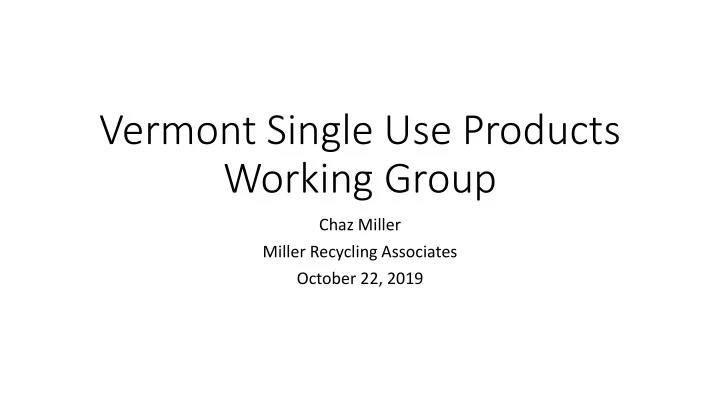

Vermont Single Use Products Working Group Chaz Miller Miller Recycling Associates October 22, 2019
WHAT I WILL COVER • EPR goals • EPR myths • Design for the environment or design for recycling?
EPR Goals • Provide incentives to manufacturers to make changes that can result in less toxic, easier to recycle products/packaging • Provide for convenient collection opportunities for used products/packaging, that can result in increased recycling rates • Provide financial relief to municipalities and taxpayers for the costs of managing used products/packaging (the costs can be embedded)
LESS TOXIC? • Toxics in Packaging Reduction Act • Vermont one of 19 states to enact • De facto national law
PRODUCT REDESIGN? • OECD: no product redesign • Disruptor fees date back to 2011 • Eco-modulation fees new attempt to overcome the failure of disruptor fees • Reality is that these fees are greatly outweighed by economic and environmental benefits of some “ nonrecyclable ” packages
CONVENIENT COLLECTION OPPORTUNITIES? • How to protect small hauler/recyclers? • How to ensure two existing MRFs get payments that cover their actual costs? • How to guarantee recyclables will continue to be processed in Vermont if more New England states/New York adopt EPR for packaging & paper?
FINANCIAL RELIEF TO MUNICIPALITIES & TAXPAYERS? • Will taxes be lowered? • Regressive tax with biggest impact on lower income Vermonters
MYTH: “PRODUCER” GROUPS • Industry working together
MYTH VERSUS REALITY: “PRODUCER” GROUPS • Industry working together OR • Companies writing a check which is simply the cost of doing business • Compliance costs
MYTH: ECONOMIES OF SCALE • Economies of scale rationalize the recycling system with lower costs
MYTH VERSUS REALITY: ECONOMIES OF SCALE • Economies of scale rationalize the recycling system and lower costs BUT • If economies of scale are good, why not one grocery chain or gasoline company for all of Vermont?
MYTH: PRODUCERS PAY FOR RECYCLING • Producers pay the full cost of recycling
MYTH VERSUS REALITY: PRODUCERS PAY FOR RECYCLING • Producers pay the full cost of recycling OR • They pay what the “producer” organization believes to be reasonable costs for both collection & processing, not necessarily the real costs
MYTH: PRODUCERS INTERNALIZE COSTS • Producer cost internalization sends a price signal to consumers
MYTH VERSUS REALITY: PRODUCERS INTERNALIZE COSTS • Producer cost internalization sends a price signal to consumers OR • Just a pass through cost the consumer doesn’t know about
IS EPR GOOD FOR THE ENVIRONMENT? • Design for recycling or • Design for the environment? • Sustainable Materials Management
ENVIRONMENTAL IMPACTS OF COFFEE PACKAGING CHOICES Steel Can Rigid Plastic Container Flexible Pouch data source USEPA Package weight for 11.5 ounces of 4 3 0.4 coffee 72.5% 28.2% 0% Recycling rate by consumer MSW landfilled after recycling 598 1171 217 (lbs./100,000oz of coffee) Packaging GHG emissions, lbs. 0.77 0.28 0.05 CO2e/11.5oz of coffee GHG benefit of packaging recycling, lbs. -0.45 -0.16 -0.02 CO2e/11.5oz of coffee Packaging net GHG emissions, lbs. 3,800 1,996 413 CO2e/100,000 oz. of coffee Packaging energy consumption, 7.5 11.5 0.9 MJ/11.5oz of coffee Energy benefit of packaging recycling, -5.0 -9.4 -1.3 MJ/11.5oz of coffee Packaging net energy consumption, 33,489 76,721 7,722 MJ/100,000 oz. of coffee
CONCLUSION: • Packaging is a particularly complicated area • Behavior change is crucial to recycling • Extended producer responsibility does not change packages or individual recycling behavior • Extended producer responsibility creates a monopoly that controls collection and processing of traditional recyclables
FOR FURTHER INFORMATION Chaz Miller 301-346-6507 chazmiller9@gmail.com • Chaz Miller’s career in waste and recycling spanned four decades with stints at the US EPA Office of Solid Waste, the Glass Packaging Institute and the National Waste and Recycling Association. He testified on waste and recycling issues at Congressional and state hearings and spoke at conferences throughout North America. He was a plenary panel speaker at the UN Zero Waste Conference in Tokyo and spoke at a paper recycling conference in China. He is a member of the Maryland Recycling Network Board and an ex officio member of the Board of the Northeast Recycling Council and Chair of the NERC-NEWMOA Recycling Markets Committee. • He speaks and writes often on extended product stewardship. Most recently he wrote Recycle British Columbia’s Extended Producer Responsibility for Packaging and Paper: An Assessment of Its Impact. His paper, “From Birth to Rebirth: Will Product Stewardship Save Resources ”, was named Best Paper at the 19 th Fall Meeting (2011) of the American Bar Association Section of Environment, Energy and Resources. • Although he is now retired from full time work, he consults and continues to write his award-winning column “The Circular File” for Waste360 and to speak at waste and recycling conference sin the United States and Canada. He was recently named Chair of the Montgomery County, Maryland, Aiming for Zero Waste Task Force.
Recommend
More recommend